When choosing a generator for your home, there are countless options on the market. What you pick has a lot to do with your intended needs, but there are also some common and emerging features that you should look for.
Whether you are preparing for emergencies or regular power outages, here are some tips for choosing the right generator for your home. Unless you want to make your own using this blueprint.
Trustworthy Reviews and Certifications
Begin your search by consulting credible sources, rather than relying on online star ratings. When tested by professional reviewers, performance and safety are measured against the specifications quoted by manufacturers.
Consumer Reports, Wirecutter, and Popular Mechanics are some great sources for in-depth expert reviews. A major benefit to using these sources for your research is that they test many generators, not just one or two, giving you deep insight based on the collective experience of using dozens of other generators.
Power Output Needs
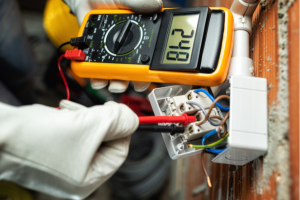 Choosing a generator with sufficient power output can be a bit tricky when it comes to powering your whole home. Many appliances have operating wattages that fluctuate. The compressor on your refrigerator, for example, uses more electricity while starting than it does while running.
Choosing a generator with sufficient power output can be a bit tricky when it comes to powering your whole home. Many appliances have operating wattages that fluctuate. The compressor on your refrigerator, for example, uses more electricity while starting than it does while running.
This spike in energy demand can be enough to trip fuses or damage components if the power supply is insufficient. Likewise, generators do not provide a consistent power supply.
Changes in the wind direction can slightly reduce how much oxygen the generator receives, and variations in fuel quality can each make the combustion less efficient. Fouling of parts and the air filter can gradually reduce efficiency as well. This means you need to get a generator that has plenty of extra power to compensate for fluctuations and you also need to calculate your total energy needs. 5,000 watts is a good starting point, with larger homes needing more.
Fixed or Portable
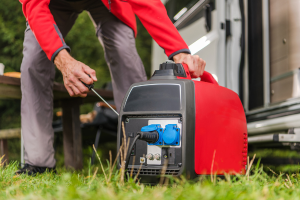 As preppers, we know the day may come when we need to bug out. This puts a constraint on the type of generator we should buy. Fixed backup generators are great for the home because they have high wattage capabilities and often auto-start. The clear drawback is that they are not portable.
As preppers, we know the day may come when we need to bug out. This puts a constraint on the type of generator we should buy. Fixed backup generators are great for the home because they have high wattage capabilities and often auto-start. The clear drawback is that they are not portable.
Fixed generators are significantly better for bugging in but come with a price tag high enough to make you think twice. And speaking of bugging in, a good friend of mine recommended me this book that has some great tips on what to do so you never have to leave your home.
A portable generator will give you more flexibility but is also more cumbersome to operate. You will likely need to manually start the generator each time the power goes off, though you can get models with auto and even remote start capabilities. For the cost of a fixed backup generator, you can get two portable generators with close to the same output, combined. Of course, portable generators can be put in the back of the truck quickly, giving you mobile power when needed.
Multi-Fuel Capability
The less restricted you are by fuel, the better. Buy a generator that can run on multiple fuel sources or comes with conversion kits. Propane generators may be a great solution if you have room to install a large propane tank on your property, giving you fuel with an indefinite shelf life if stored properly. An added benefit to propane is tri-fuel generators, which can function on propane, natural gas, or gasoline.
There are also diesel generators that can use biodiesel and some oils. Whatever you choose, make sure it can run more than one fuel type. And of course, you can make your own fuel.
Hybrid systems are increasingly coming to the market, allowing you to use fuel to run the generator at night and solar panels to charge on-board batteries during the day. When combined with high-capacity power banks in your home, you can easily maintain electrical supply 24/7.
Safety Features
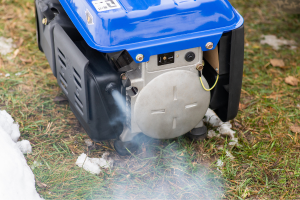 Generators with built-in safety features can help protect you and your generator at the same time.
Generators with built-in safety features can help protect you and your generator at the same time.
Be sure to get one with a spark arrestor to prevent fires, low-oil shutoff to prevent damage to the motor and heat build-up, and a carbon monoxide detector with automatic shutoff.
Generators are often better used outdoors, but life has a way of throwing wrenches at us, so make sure the generator has as many safety features as possible in case you need to use it indoors or around combustibles. Silent generators are normally a “nice-to-have” but are a safety feature when SHTF. Securing electricity for your home should not attract the attention of distant ears.
Truly silent generators do not exist (yet), but some are very quiet. Inverter generators run their engines commensurate with the load they are under, so they are quieter when the load is smaller.
Multiple Outlets
When it comes to outlets on your generator, you will want as many options as possible. 120V and 240V wall sockets and USB sockets are a good start. If you have a welder or appliances that require different plugs, like 240V L14-30R sockets, you will naturally want to have that as well.
Related: Deadly Mistakes You Make When Using a Generator
Many generators come with detachable control panels, making it easier for you to operate the generator outside while being able to plug your electronics into the control panel indoors. This prevents you from needing long extension cords or exposing plugs to the elements.
Home Transfer Capability
As a home generator, one of the absolute best features you can get is a home transfer connection. This requires professional installation into your home circuit breaker but allows you to plug the generator directly into your home. With this capability, you do not need many of the other features, like multiple outlet types, because you can just use the outlets in your house.
This is a major component of the home microgrid and can provide you with energy independence when combined with solar panels or small wind turbines. Smart generators function in stand-by mode, automatically switching on and off as grid power is lost or gained. Many of these generators are also portable, meaning you can take your microgrid with you when bugging out.
Choosing the right home generator has a lot to do with what you can afford and your intended usage. As preppers, you know the day may come when you need to use the generator during a crisis. Choose one that is highly rated with as many safety and function features as possible, along with the flexibility of fuel sources and high output. The Swiss Army Knife approach is best.
You may also like:
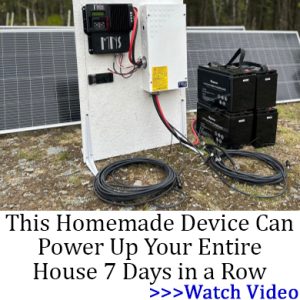 Read This Before Storing Water in Milk Jugs
Read This Before Storing Water in Milk Jugs
The First States That Will Go Down During a Blackout. Do You Live in the Red Zone? (Video)
How to Hide Your Livestock When SHTF

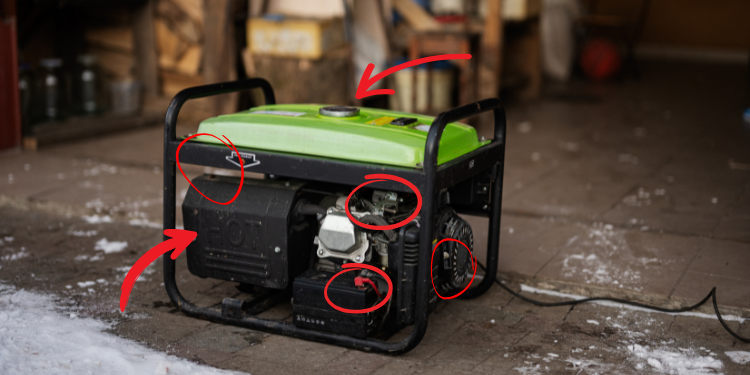













one important item you forgot to mention is with a home transfer box it prevents linemen from getting electricuded when they’re working on a line due to damage like in an ice storm. my generator is a dual fuel. with propane it only puts out 8000 watts but with gas it puts out 9000 watts. i have 10 propane bottles i keep in a cage behind the shed. i found out the hard way if the exhaust is facing the wind the carbon monoxide detector will shut the generator down. this is a good article. does anyone know how long a generac type generator will run on a 500 gal. tank? i’ve heard they really suck the gas down. also, don’t forget to winterize the generator and extra fuel cans.
We wanted to buy a $2500 Generac propane generator. But the quote to install it was over $9500. All we wanted it to power was the well pump, pellet stove, and two basement freezers. Needless to say, we didnt do it. The installers are scam artists. There is no reason installation should cost that much. Makes me sick how greedy some companies are.
Susan,
The company I work for installs a lot of generators. I can assure you, nor I or the other salesmen in our company are scam artists. Let’s break down your situation of wanting to install a $2,500.00 propane fired generator. Do you already have a propane tank? I am not talking about a propane tank that you would have on a gas grill; I am speaking of a permanently installed tank minimum of 300 gallons. If not, add several thousand dollars for a tank and fuel. If you do, how much do you think it will cost to have a plumber install the gas line and hook up the generator. There is another $1,000.00 or more depending on the distance. Then you have to a transfer switch. More than likely an automatic transfer switch. You could get one with a small load center to feed your well pump, pellet stove and freezers. Add another $1,000.00 plus. Now you have purchased all of the equipment, but we still have to hire an electrician. Electricians do not come cheap. Tack on a couple of thousand for him. Have you priced copper and conduit lately? Just for grins and giggles, let’s tack on a thousand for materials. Wait, it still doesn’t run?!? Oh shoot! These things don’t come with a start battery? Well, there goes another $250.00! Sounds to me like a turnkey installation of permanently installed home standby generator for $9,500.00 is very much in the ballpark of what it should cost.
Pleas prove me wrong,
Around here, most rural folks with backup power, are opting for Cummins, in stead of Genrac… Several had Genrac’s but were unhappy with its performance, and after making the change have reported better results from propane usage to all around serviceability … One more word, Cummins is Onan, a generator that equips roughly 90% of all motor homes manufactured here in the USA… I started looking into all this when I found a Genrac for sale on line… I contacted and visited with the seller, only to find out that he had switched from Genrac to Cummins/Onan for the reasons above… I appreciated his honesty, and moved on, I then noticed around the rural area about a 75% Cummin’s/Onan to 25% Genrac… My son was about to opt for Genrac until he looked at the overall cost and ended up going with Cummin’s/Onan… I have not made my purchase as of yet as I’ve got a portable dual fuel generator set for my small old farm house, and am pleased with its operation when I have outages… Nothing automatic, I have to manually make the switch… My old home is heated with central a/c and heat, but this old house has propane outlets in each room, therefore as a heating back up I have propane space heaters in each room, and a wood burning fireplace in the livingroom… I also have electric space heaters to alternate from propane to electric just so I can conserve my propane, as propane aint cheap….lol.. I’ve been doing this for the past 2 Winters… I learned my lesson during my first Winter… By the way, this is one of the better articles that I’ve read… I do always get a kick out of the comments… lol
Poppy.
We bought our 14k Generac in 2012. In 2019 we had to replace a diode and brushes for a cost of $580. Other than that, our Generac works flawlessly. Keep in mind I change the oil every year and spark plugs and air filter when needed. The total system cost with automatic smart switch was $5,600 – brand new / installed. In 2021 we bought a 325 gal propane tank with propane for $1,200 plus $750 for the valve set up to go between natural gas and propane. Now we can run on both natural gas or propane. All we have to do is slide the valve on the Generac (to run the appropriate fuel) and configure the valves accordingly and that’s it.
Jeff, I see that you made an excellent choice… Your Genrac obviously suits your needs and with you keeping up with its maintenance it should last you for several more years… my comment was my weak comparison between Genrac and Cummins/Onan… Sooo many folks have opted for Genrac usually because they do not know of Cummins/Onan… Genrac has a huge huge media campaign airing on anything transmittable to a tv… Rarely will you ever see an ad for Cummins/Onan, as the majority of their customers are commercial, ie, government facilities, hospitals, communication stations, and radio/cell towers… I’ve also noticed Cummins/Onan giving Caterpillar a run for their money in the oilfield area… so its understandable that many folks don’t know that Cummins/Onan exists … My Son didn’t even know about Cummin’s/Onan until I mentioned it… Like I stated, my situation is manual, meaning I drag out my dual fuel generator and move it over to where I have installed a receptacle… My power outages typically last a couple of day to as much as a week so it has worked just fine for me… Our East Texas Winter weather can’t compete with those above the Mason Dixon Line… We do get some super cold days, but they only last for a few days, hardly ever a week, before the sunshine appears warming everything back up…Still, living among big trees, limbs and trees must fall… I learned my lesson my first Winter… I’d like to say, as far as power goes, I’m prepared enough to handle at least up to a couple of weeks, thats about the end of my fuel, both non ethanol gasoline and propane… I can only wish I had access to Natural Gas, but residing in the woods doesn’t afford me that luxury …I do believe in having back ups to back up the back ups… Someday I’ll upgrade my solar / wind power, right now it only powers up my commo … I think the deal you have being able to switch from LPG to NG is a great idea or vise versa is super…
Am I missing something? So solar generators are not suitable back ups when bugging out? In my estimation, not having natural gas, and neighborhood bans on 300 gallon propane tanks, the alternative is a small portable gas / propane / diesel generator. fuels which if not able to store a lot of when the SHTF … will quickly be gone. To me, that suggests solar, or if in a windy area, perhaps a small wind turbine? Both which could exist for bug in and bug out environments. Am I completely off base on this?
Mr Orion, I personally think your right on… as long as your BO AO is short lived, as with Solar and Wind your gonna need some sort of battery, and batteries have short lives… Using Wind and or Solar as a direct source of electricity would work fine as long as the sun shines and or the wind blows… I guess everything has its fault, when it comes to power sourcing … It all depends on just how long are we going to deal with the lack of electricity during an event… If its forever, well,, just what is the life of a solar panel, and or a wind driven generator with lots of moving parts… tons of ifs and buts in this discussion… Pretty sure the time duration of the event is the biggest factor… hopefully, if and when this event takes place, I pray it is short lived and most of us make through… Live long and prosper…
Orion, You are not off base, especially for your situation… Residing with in an HOA, or city ordinances, puts you at a disadvantage so solar/wind could and should be nearly perfect for you… Me coming from a huge MetroMess AO 2yrs ago to a rural setting, I know the obstacles your up against which was one of the many reasons, when giving the opportunity, I moved away… Retirement has its advantages LOL.. I just wished I’d of done it 20yrs ago…You might check with your HOA and or the city for ordinances on height and visibility restrictions for your wind turban and solar panels… I have solar panels and a small marine wind turban 400watts, that keep my batteries charged for my commo… Living rurally, in the sticks, out of sight and mind has many advantages… Live long and prosper…
I have purchased a number of used generators for use in broadcast studio applications. First, I get a peak demand readout from the electrical utility for the meter feeding the building. This gives me the peak demand for that facility. I take that and add 10% to find out what size genset I need. I then find out what fuel I will have available. Generally natural gas in cities, but if it is a transmitter site in a rural area it would be diesel or propane. I could write a whole article on choosing a fuel source, but for now those two fuels are the best choice for areas without natural gas.I then start looking for used gensets. What I have found to be the best are those that are takeouts from nursing homes since I am generally looking for 35KW or more. These are removed for reasons such as regulatory requirements. I picked one up that had been a trade in due to California emissions standards. I generally find these at about 25% of new price.
Your mileage may vary but looking for a whole house genset on the used market can be done very economically if you find one from a professional setting that kept up on service.
I will end with one piece of advice that is pretty much standard in my circle of associates. “Friends don’t let friends buy Generac”. One used Cummins/Onan I purchased was used to replace a Generac. I paid less for the Cummins/Onan with only 250 hours than what it cost to replace the equipment blown up on a number of occasions by a Generac. Again, these were all used in professional settings and a bit larger than what the standard home would use but a good used nexpensive 15KW on up would make the transfer switch and everything else necessary a lot cheaper in the long run.
Very Important
Cost vs return on investment
cheep vs expensive
most buy at the advice of some sale person who really does not know much
like most , they just have a job , see more product
Do the Research , See what is the Best , by lots of Reviews
Dont Trust some saleman , most are just that , a job
like the solar industry , the return is Lousy and they never tell the whole picture
Always consider your area and what your needs are
Write it down , list out all variable s , pros , cons , price , vs size
What are the actual needs
Fridg, outlet, Heat
or just enough to get by
usually the ratio is 1 circuit 2400 watts , 1 heat unit 6k watts ,
water heaters , heaters , well s , pumps use a lot of power
start , stop usually has ramp up or return to idol speeds which is a lot of changing of speed
is the unit you choose for emergency only or luxury while out of power
1 outlet 2400 watt
1 water heater 4600 watts
1 heater unit another 4600 watt s
well do the math , does not equal a 6000 watt system
Do the research
you get what you pay for
and the saleman does not care what you get as long as he or she gets commission
Christopher, well stated… I would add, locate a master electrician who is willing to assist you in doing all that figuring… it can be mind bending… You right on about those sales folks, they just know enough to make the sale… very good comment… thanks for sharing the info… Live long and prosper…